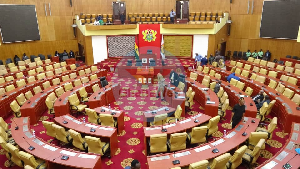The vibrant timber industry in Takoradi, that was a major employer in the Western Region, is gradually collapsing because of the rapid depletion rate of timber species in the region.
The General Manager (GM) of John Bitar Timber Company Mr. Mohammed Jouni revealed this, in an interview with the Business Chronicle, during an interview last week.
According to Mr. Jouni, most logging companies have already collapsed due to the policies that banned the export of unprocessed lumber.
"The problem is not only the cutting of the logs but the request of the European countries, asking for certificates from timber companies", he stated.
The Western Region is the richest in forest resources and therefore timber logging and processing of wood related products constitute an important economic activity.Prime wood, Past timbers, Stanwood, John Bitar, Rad Forest Product Company are the timber processing companies in the Metropolis, producing Lumber, Veneer, plywood and knockdown furniture mainly for export.
Currently, only 5% of the wood waste generated annually is used for fire boilers. There exists an estimated 42, 000 metric tonnes of sawdust and off cuts to be recycled for further use.
New timber species Offram, Avodar, Ohaa, Esia, Wawa, Bima, and Potrodum can all be used to produce furniture and for the construction industry.
According to Mr. Jouni, chain saw operators in the region are a hindrance to the development of the timber industry. He reiterated, "These operators should be arrested and punished."
John Bitar, which has been operating for the past 50 years, and the only timber company in Ghana, which exports timber products, has been successful throughout its operations.
The secret of the company, he said, was sound mind, good management and good principle. The company currently has a work force of 1,290.
The Business Chronicle also visited the offices of Rad timbers, which is one of the functioning companies that have been operating for a long time.
Mr. Bonney Williams, the Personnel Manager of Rad timbers said the taxes placed on their goods should be reduced and complained also about the cumbersome tax system of the Forestry Commission.
He pleaded with the government to get buyers for the timber products from the region. He said access to, and cost of credit is difficult and high.
A member of the Forest Watch, an environmental awareness group, Mr. Albert Katako, disclosed that there are only two winners of the revenue in the timber industry.
The first, he said was that the money foregone by the Forestry Commission (FC) is realized by timber companies. Secondly, if it is not already happening, then it is only a matter of time before FC officials and politicians began to accept or demand bribes from the industry for guaranteeing this windfall.
"Certainly, many stakeholders today believe that the relationship between timber companies and state officials is characterized by corruption".
He explained that the losers of revenue are the FC. Under the current arrangement, the FC as an institution would be entitled to 60% of Timber Recourse Forestry (TRF), to cover the costs of managing the country's forests.
According to him, an increase of the FC's budget by $60million would improve staff remuneration, training, equipping and improving working conditions incredibly.
Again, under the current arrangement, 40% of this foregone TRF goes to traditional authorities and district assemblies, for the benefit of forest dependant communities. Ideally, the money should be invested to compensate the communities for the extraction of their forest resources.
Mr. Katako said the money should be used to help develop alternative and more lucrative livelihoods that are compatible with sustained forestry and away from cocoa and oil palm, which destroy natural forests.
"It is not difficult to imagine what impact an annual investment of $40 million would make on the lives of the 60%-70% of our rural population who live in forest areas," he submitted, asking, "Why do district assemblies and traditional authorities accept to forego this revenue?"
He said if the FC pays the 900billion that it loses, from the annual uncollected Timber Rights Fees, into the consolidated fund, Ghana would benefit tremendously.
Forest Watch, according to him demand an action to cancel all illegal Timber Utilisation Permits, Timber Utilisation Contracts and replacement allocations, halt logging operations conducted under these, and recover monies owed by the beneficiaries to the state, among others.
Business News of Friday, 15 April 2005
Source: Ghanaian Chronicle






![Habib Iddrisu [L] and John Dumelo Habib Iddrisu [L] and John Dumelo](https://cdn.ghanaweb.com/imagelib/pics/235/23595233.295.jpg)









